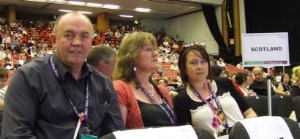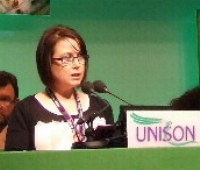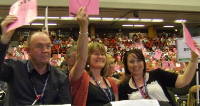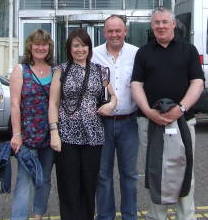Annual Delegate Conference
16th -
19th June 2009 in Brighton
A high profile for the branch at this year's
conference
Click
here for a conference overview.
 Your
delegation was very active at this year's conference as one of our
motions and two of our amendments were on the agenda. Both Kate
Ramsden, Branch Chair and Susan Kennedy, our first time delegate,
spoke at conference. Your
delegation was very active at this year's conference as one of our
motions and two of our amendments were on the agenda. Both Kate
Ramsden, Branch Chair and Susan Kennedy, our first time delegate,
spoke at conference.
Unfortunately Tricia Morrison was unable to attend for health reasons.
We send Tricia our best wishes for a speedy recovery.
Kate was also on the Newssheet Team which provided briefings and
reports throughout conference.
top
Defend our public sector pensions
Our pensions motion, approved
for submission to conference at this year's AGM in February, was
composited (merged) with motions from Newcastle and Edinburgh, and
was heard on the Friday morning.
 Conference
supported the composite and condemned attacks on public sector pensions
by press and politicians. It recognized that this threat will only
grow if a Tory government get into power at the next general election
and threw its weight behind a range of measures to defend our members
pensions. Conference
supported the composite and condemned attacks on public sector pensions
by press and politicians. It recognized that this threat will only
grow if a Tory government get into power at the next general election
and threw its weight behind a range of measures to defend our members
pensions.
Kate Ramsden, Branch Chair and conference delegate told conference
that it has been open season on our pensions with the press referring
to them as "gold plated" and a "luxury the country can't afford.
But an average local government pensioner gets just £74 per week.
"Not a huge amount, said Kate, but without it they would be forced
onto full state pension and would face poverty in old age.
She slammed the Tories plans to "reform" our pension. "We should
be clear that by this they mean the destruction of public sector
pensions," said Kate, rejecting accusations that our pensions are
unsustainable and unaffordable.
She called on the NEC to provide information to all our members
on the plans for public sector pensions of all the parties standing
for election to enable members to make an informed choice about
who they vote for, and she urged delegates to campaign in their
branches to defend pensions.
"This fight belongs to all of us. These are our pensions which
are under threat and we all must take responsibility for defending
them - not just for ourselves but for all those who may yet work
in public services."
top
Time to address mileage rates 'disgrace'
 Another
issue close to the hearts of our members is the thorny issue of
mileage allowances, and our
amendment was incorporated into a composite motion. Another
issue close to the hearts of our members is the thorny issue of
mileage allowances, and our
amendment was incorporated into a composite motion.
As a result, UNISON will seek urgent negotiations with the Inland
Revenue for an increase in the seven year old 40p 'approved' mileage
rate. Conference also called for regular reviews of the rate.
The 40p is the figure set by the Inland Revenue and any additional
payment from an employer is taxed, leaving staff no better off.
Our first time delegate, Susan Kennedy, spoke to our amendment
and highlighted the particular case of low paid members in rural
areas who pay a larger proportion of their salary on mileage costs
and can end up subsidising the council due the large distances travelled
and low mileage rate.
"Let us be clear. This is not a green issue. We applaud the reduction
in non-essential car use that the rising fuel costs have brought
about. But our members, especially those in rural areas, need their
cars to do their jobs. They don't have a choice.
"They need their cars to make sure that vital services are provided
to the most vulnerable in our society. Services like home care for
the elderly and disabled - a lifeline in rural communities, but
provided by some of our lowest paid members", said Susan.
"Whilst prices have come down since the fuel crisis last year they
are still high, and running a car for work eats into our members'
incomes and for low paid members risks becoming a pay cut. "The
mileage allowance paid by most authorities in Scotland is 40p per
mile. This has not been increased since 2002 and that is a disgrace",
she added as she called for the union to put pressure on the government
for an immediate rise in the mileage rate determined by the Inland
Revenue and an agreement for regular reviews.
top
Domestic violence/abuse underlined as a workplace
issue
But debate on perpetrators continues
 Conference
backed a strategy to negotiate workplace agreements on domestic
abuse, giving better support to victims, but failed to grasp the
nettle of what to do about perpetrators. The National Women's Committee
failed to support Aberdeenshire's
amendment which made it clear that perpetrators of abuse would
be in our membership as well as victims. and called for action to
encourage perpetrators to address their behaviour. We also called
on the union to ‘publicise its zero tolerance of domestic violence
alongside services that are in place to manage perpetrators and
help them address their behaviour. Conference
backed a strategy to negotiate workplace agreements on domestic
abuse, giving better support to victims, but failed to grasp the
nettle of what to do about perpetrators. The National Women's Committee
failed to support Aberdeenshire's
amendment which made it clear that perpetrators of abuse would
be in our membership as well as victims. and called for action to
encourage perpetrators to address their behaviour. We also called
on the union to ‘publicise its zero tolerance of domestic violence
alongside services that are in place to manage perpetrators and
help them address their behaviour.
The National Executive Council (NEC) asked the branch to remit
the amendment, that is, to withdraw it from the conference agenda.
In return, they agreed to consider the terms of the amendment when
acting on the motion.Your delegation reluctantly agreed to remit
our amendment to the NEC.
City of Edinburgh had a similar amendment but refused to remit.
This was heard and debated but defeated on a vote.
Kate Ramsden, Branch Chair, speaking to the Aberdeenshire amendment
before agreeing to remit, said,“ We are puzzled by the National
Women’s Committee’s opposition but have accepted their assurance
that the new model guidance will include the union’s commitment
to enabling perpetrators of domestic violence to address their behaviour,
whatever their gender may be, and will publicise the programmes
available to them.”
Kate had earlier said,“We should remember that the victims of domestic
abuse are not just those who experience it directly”, pointing out
that children living in households where abuse takes place can also
be significantly affected.
“We must give a clear message that we have zero tolerance of domestic
violence”, added Kate. “However, we must also recognise that those
who perpetrate abuse do so often as a result of their own life experiences...
they need support to confront and address their behaviour”.
The Edinburgh amendment added unpaid time off for such services,
although there was not enough clarity here for the National Women's
Committee who said it would be a dangerous precedent.
top
Who's who?
Every UNISON branch elects a delegation to attend annual conference
and to vote on behalf of their local branch members. Scotland has
about 200 delegates. This branch has three. Two must be women and
one of these must be a low paid woman, to reflect the make-up of
the branch.
The Branch delegation to this year's Conference in Brighton is:
 |
|
 |
|
 |
|
 |
Kate Ramsden
Branch Chair (sharer)
|
|
Susan Kennedy
Steward (sharer) |
|
Ian McDonald
Branch Treasurer |
|
Tricia Morrison
Branch Officer |
 We are very proud that Bob Revie, our Branch Secretary, is once
again Scotland's delegate to the The Standing Orders Committee (SOC).
He was nominated by a range of Scottish branches, including our's
and elected unopposed. This is Bob's second year on the SOC. He
took over from Robin Hunter who was our excellent Scottish delegate
for many years before, and who stood down for personal reasons.
Bob is doing a great job filling his boots.
We are very proud that Bob Revie, our Branch Secretary, is once
again Scotland's delegate to the The Standing Orders Committee (SOC).
He was nominated by a range of Scottish branches, including our's
and elected unopposed. This is Bob's second year on the SOC. He
took over from Robin Hunter who was our excellent Scottish delegate
for many years before, and who stood down for personal reasons.
Bob is doing a great job filling his boots.
The SOC is responsible for the business of National Delegate Conference
and for making sure that everyone at conference abides by the rules.
top
What's what?
UNISON's annual national conference is the union's ruling body.
Every year delegates from all over the country take part in debates
to choose our campaigning priorities and policies.
Conference is chaired by the UNISON National President, who this
year is Sue Highton, or by one of her Vice-Presidents. This year
there are 133 motions on the conference agenda and 21 proposed amendments
to the UNISON rules. Only a proportion of motions will actually
be debated at Conference because there is not time to hear them
all. Motions are therefore "prioritised".
Branch motions and amendments
Our branch has two motions and three amendments on the Conference
Agenda this year. This is an all time high for us, as it is only
in the last few years that we have submitted motions to Conference.
The motions were passed at the Branch AGM in February and are on
Pensions and the UNISON
response to Baby P.
Each branch is also allowed to submit "amendments" to
motions, to add to the motion or to change a part we don't agree
with. Our amendments
were approved at a Branch Committee and amend motions on the mileage
allowance; on asylum seeker children and on domestic violence/abuse.
They all add to the motions rather than changing them in any way.
The motions we have put to conference before have not made it onto
the actual conference agenda, but we are hoping that at least one
of our motions will be prioritised and debated in conference this
year. However, because there are other motions on the same topics
it is likely that our motions will be "composited" which
means they will be merged with the others into a larger motion.
If this happens, we will, as a branch, have a right to speak to
the composite, and perhaps even to move it.
One or two of our amendments might get "composited" too,
and if this happens we will again get the right to speak. If they
are not merged into a bigger motion, and the motion we have amended
is called, we will get a chance to present our amendment and conference
will vote on it.
Motions are passed by a straight majority of the conference delegates
on a hand vote. If it is close, conference delegates or the chair
of conference can call for a card vote. The number of card votes
per delegation is based on the number of members in the branch.
Amendments to rule need to be approved by a two-thirds majority
of the voting delegates. Card votes can also be called for (and
often are) in rule changes. Thursday afternoon is traditionally
the time that the rule changes are debated. Many delegates find
this session really boring, but in recent years it has produced
some of the best debates, and often the funniest speeches.
As delegates we will vote on the motions and the rule changes in
line with branch policy, where we have that in place and we can
speak for or against any of the motions, amendments and rule changes.
Kate, as a member of UNISON Scotland's Communications and Campaigns
Committee, is also one of the three person team, that makes up the
UNISON Scotland Conference Briefing Team.The team issues briefings
throughout conference which keep Scottish delegates up to date with
UNISON Scotland's position on the debates and reports on the week's
business. The briefings have also been known to be quite amusing
and are sought after by many outwith the Scottish delegations.
top
|


 Your
delegation was very active at this year's conference as one of our
motions and two of our amendments were on the agenda. Both Kate
Ramsden, Branch Chair and Susan Kennedy, our first time delegate,
spoke at conference.
Your
delegation was very active at this year's conference as one of our
motions and two of our amendments were on the agenda. Both Kate
Ramsden, Branch Chair and Susan Kennedy, our first time delegate,
spoke at conference. Conference
supported the composite and condemned attacks on public sector pensions
by press and politicians. It recognized that this threat will only
grow if a Tory government get into power at the next general election
and threw its weight behind a range of measures to defend our members
pensions.
Conference
supported the composite and condemned attacks on public sector pensions
by press and politicians. It recognized that this threat will only
grow if a Tory government get into power at the next general election
and threw its weight behind a range of measures to defend our members
pensions.  Another
issue close to the hearts of our members is the thorny issue of
mileage allowances, and
Another
issue close to the hearts of our members is the thorny issue of
mileage allowances, and  Conference
backed a strategy to negotiate workplace agreements on domestic
abuse, giving better support to victims, but failed to grasp the
nettle of what to do about perpetrators. The National Women's Committee
failed to support
Conference
backed a strategy to negotiate workplace agreements on domestic
abuse, giving better support to victims, but failed to grasp the
nettle of what to do about perpetrators. The National Women's Committee
failed to support 



 We are very proud that Bob Revie, our Branch Secretary, is once
again Scotland's delegate to the The Standing Orders Committee (SOC).
He was nominated by a range of Scottish branches, including our's
and elected unopposed. This is Bob's second year on the SOC. He
took over from Robin Hunter who was our excellent Scottish delegate
for many years before, and who stood down for personal reasons.
Bob is doing a great job filling his boots.
We are very proud that Bob Revie, our Branch Secretary, is once
again Scotland's delegate to the The Standing Orders Committee (SOC).
He was nominated by a range of Scottish branches, including our's
and elected unopposed. This is Bob's second year on the SOC. He
took over from Robin Hunter who was our excellent Scottish delegate
for many years before, and who stood down for personal reasons.
Bob is doing a great job filling his boots.
